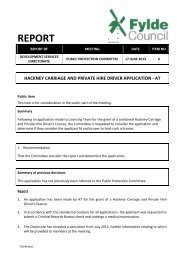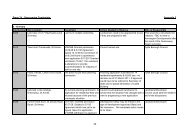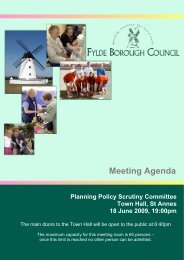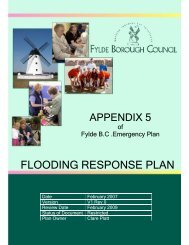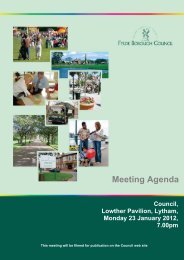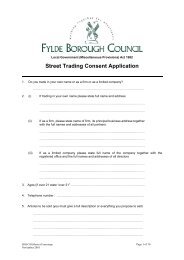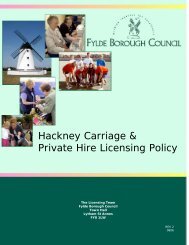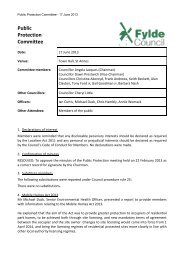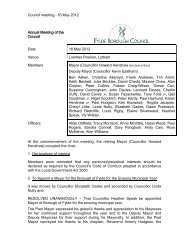Emergency Plan - Fylde Borough Council
Emergency Plan - Fylde Borough Council
Emergency Plan - Fylde Borough Council
Create successful ePaper yourself
Turn your PDF publications into a flip-book with our unique Google optimized e-Paper software.
<strong>Emergency</strong> <strong>Plan</strong> February 2007<br />
e) Assisting the police with the recovery of bodies.<br />
f) The provision of monitoring procedures in respect of health and safety of those persons<br />
operating within an established inner cordon.<br />
g) Carrying out essential damage control operations, such as pumping out flood water and<br />
salvage works (some fife services charge for such operations).<br />
h) Assisting other relevant agencies, particularly the local authority, to minimise the<br />
effects of major flooding on the community.<br />
The Ambulance Service<br />
The primary areas of Ambulance Service responsibility are summarised as follows:<br />
a) Providing a focal point at the incident, through an Ambulance Control Point, for all<br />
NHS/medical resources.<br />
b) The saving of life, in conjunction with other <strong>Emergency</strong> Services.<br />
c) The treatment and care of those injured at the scene. either directly or in conjunction with<br />
medical personnel.<br />
d) Either directly or in conjunction with medical personnel, determination of the priority<br />
evacuation needs of those injured.<br />
e) Determining the main "Receiving "hospitals for the receipt of those injured.<br />
f) Arranging and ensuring the most appropriate means of transporting those injured to the<br />
receiving hospitals,<br />
g) Ensuring that adequate medical manpower and support equipment resources are available at<br />
the scene.<br />
h) Providing communications facilities for National Health Service resources at the scene.<br />
i) Restoring normality at the earliest opportunity.<br />
1.3.1 Roles and Responsibilities of Other Organisations<br />
Public Utility Companies<br />
Public utility companies will:<br />
a) Secure their services and equipment.<br />
b) Repair services disrupted by flood events.<br />
c) Provide alternative means of supply during service disruption if life and health risks are<br />
identified.<br />
d) Advise local authorities and the communications media when disrupted services will be<br />
reinstated.<br />
The Communications Media<br />
The communications media organisations will:<br />
a) Disseminate flood warnings received from the Environment Agency to agreed standards.<br />
b) Disseminate updated information during a flood event.<br />
c) Disseminate stand-down messages received from the Agency to agreed standards,<br />
The General Public<br />
Members of the general public are advised to:<br />
a) Make themselves aware of the action which they should take in the event of flooding if they<br />
live or work in an area covered by a flood warning service.<br />
b) Avoid putting themselves at risk.<br />
c) Move property, including motor vehicles, to higher ground upon receiving a flood warning.<br />
d) Stay aware of developing conditions by listening to local radio and/or listening to Floodline.<br />
e) Riparian owners and occupiers have particular responsibilities in respect of watercourses and<br />
these are set out in the Environment Agency's publication "Living on the Edge".<br />
Appendix 5<br />
3<br />
Uncontrolled if Printed<br />
Rev.0



